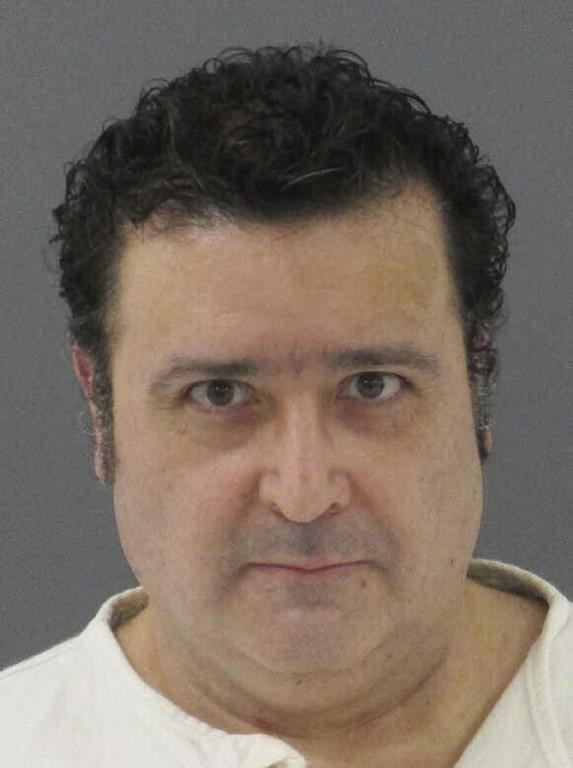Texas man executed for 2001 killing of 5-year-old girl abducted from a store

Posted Nov 16, 2023 01:31:47 AM.
Last Updated Nov 17, 2023 12:01:39 AM.
HUNTSVILLE, Texas (AP) — A Texas man convicted of strangling a 5-year-old girl who was taken from a Walmart store nearly 22 years ago and burning her body was executed Thursday evening.
David Renteria, 53, was pronounced dead at 7:11 p.m. CST following an injection at the state penitentiary in Huntsville for the killing of Alexandra Flores. Renteria prayed, sang and asked for forgiveness before his execution.
“I’m sorry for all the wrongs I have done. And for those who have called for my death, who are about to murder me, I forgive you,” he told those present in a loud, clear voice. He was pronounced dead 11 minutes later after receiving a lethal dose of pentobarbital, a powerful sedative.
Renteria sang a hymn in Spanish, then prayed with a spiritual adviser standing next to him, and sang another hymn in English after witnesses, including relatives of his victim, entered the death chamber and watched through a window a few feet (meters) from him.
“There is not a day that goes by that I do not think about the fateful events of that day and what transpired,” he said, looking at his victim’s relatives. “There are no words to describe what you’re going through, and I understand that.”
He told his sister and a friend, watching through another window, that he was “good … strong.”
“I love you all, I truly do. I’ll see you in the next life.”
He then began reciting The Lord’s Prayer as the drugs began flowing. “Our father, who art in heaven” is as far as he got. “I taste it,” he said of the drug, mumbled something, took two loud breaths and snored twice before all movement stopped.
Ignacio and Sandra Frausto held a photo collage of their slain sister, the baby among eight children in their family, while speaking with reporters after they had watched Renteria die.
“I want to recognize her, not forget about her,” Ignacio Frausto said through sobs. “It took 22 years but the time came. It is done. We can finally and really begin to heal — 22 years of wondering what was going to happen.”
Prosecutors said Flores was at the El Paso store on Nov. 18, 2001, during a Christmas shopping outing when she was abducted from the store, strangled and her body set on fire. The body was found the next day in an alley some 16 miles (25 kilometers) away.
Renteria’s execution proceeded after the U.S. Supreme Court declined two separate defense requests for a stay earlier in the day.
One request stemmed from efforts by Renteria’s attorneys to gain access to evidence they said could have shown he was not responsible for her death. Another appeal rejected by the high court without comment late Thursday focused on claims the state’s supply of pentobarbital, the execution drug, had degraded and would cause him “terror” and “severe pain” in violation of the Eight Amendment’s ban on cruel and unusual punishment.
Authorities said evidence showed Renteria, a convicted sex offender, carried out the abduction and killing alone and that his lawyers did not raise that defense at his trial. Blood found in Renteria’s van matched the slain girl’s DNA, according to prosecutors, who added that his palm print was found on a plastic bag put over the girl’s head before her body was set on fire.
Renteria was accused of patrolling the store for about 40 minutes before zeroing in on the 5-year-old girl. Grainy surveillance video showed her following Renteria out of the store.
The execution was one of two carried out Thursday in the United States. In Alabama, inmate Casey McWhorter received a lethal injection Thursday evening for a murder conviction in the fatal shooting of a man during a 1993 robbery.
Renteria had long claimed that members of a gang called Barrio Azteca, including a person using the nickname “Flaco,” forced him to take the girl by making threats to his family — and that it was the gang members who killed her.
In August, state District Judge Monique Reyes in El Paso granted a request to stay the execution and ordered prosecutors to turn over their files in the case. The Texas Court of Criminal Appeals later overturned Reyes’ orders.
In 2006, the Texas Court of Criminal Appeals threw out Renteria’s death sentence, saying prosecutors provided misleading evidence that gave jurors the impression Renteria was not remorseful.
During a new resentencing trial in 2008, Renteria was again sentenced to death.
Renteria was the eighth inmate in Texas put to death this year. There have been 23 executions in the U.S. this year, including the two carried out on Thursday.
___
Lozano reported from Houston.
___
Follow Juan A. Lozano on X, the platform formerly known as Twitter: https://twitter.com/juanlozano70
Juan A. Lozano And Michael Graczyk, The Associated Press








